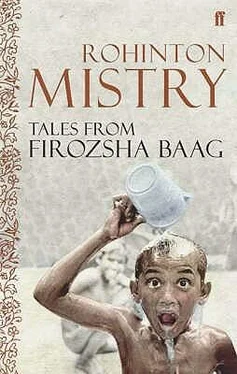Rohinton Mistry - Tales From Firozsha Baag
Здесь есть возможность читать онлайн «Rohinton Mistry - Tales From Firozsha Baag» весь текст электронной книги совершенно бесплатно (целиком полную версию без сокращений). В некоторых случаях можно слушать аудио, скачать через торрент в формате fb2 и присутствует краткое содержание. Год выпуска: 2006, Издательство: Faber & Faber, Жанр: Современная проза, на английском языке. Описание произведения, (предисловие) а так же отзывы посетителей доступны на портале библиотеки ЛибКат.
- Название:Tales From Firozsha Baag
- Автор:
- Издательство:Faber & Faber
- Жанр:
- Год:2006
- ISBN:нет данных
- Рейтинг книги:3 / 5. Голосов: 1
-
Избранное:Добавить в избранное
- Отзывы:
-
Ваша оценка:
- 60
- 1
- 2
- 3
- 4
- 5
Tales From Firozsha Baag: краткое содержание, описание и аннотация
Предлагаем к чтению аннотацию, описание, краткое содержание или предисловие (зависит от того, что написал сам автор книги «Tales From Firozsha Baag»). Если вы не нашли необходимую информацию о книге — напишите в комментариях, мы постараемся отыскать её.
Tales From Firozsha Baag — читать онлайн бесплатно полную книгу (весь текст) целиком
Ниже представлен текст книги, разбитый по страницам. Система сохранения места последней прочитанной страницы, позволяет с удобством читать онлайн бесплатно книгу «Tales From Firozsha Baag», без необходимости каждый раз заново искать на чём Вы остановились. Поставьте закладку, и сможете в любой момент перейти на страницу, на которой закончили чтение.
Интервал:
Закладка:
All in the compartment were now asleep or trying to attain that envious state. Even the ones hanging from the straps like drowsy trapeze artists, lost in a swaying, somnolent exercise. Occasionally a new set of people entered when the train stopped. They were noisy and fidgety at first. But the contagion of lethargy quickly subdued them. They fell silent under the spell of the whirring fans which swivelled jerkily from side to side. With a nervous tic, twitching like victims of a heat-induced malady.
Sleep was one way to escape the discomfort; Jehangir shut his eyes to see if he could. He ceased bracing himself against the movement of the train, allowed the head and shoulders to droop forward to sway, and let his whole body sway with the train, unresisting. Like his parents’ opposite him, his movement became one with the movement of the compartment. Rolling to and fro, swaying side to side, as the train decreed. Surrendering to the torridity of the air and the hypnotic drone of the fans, the close click-click of the standees’ metal straps and the seemingly remote clackety-clack of the rails, he was ready to cross over from the edge of torpor into slumber, succumbing slowly to the swaying, swaying slowly.
The train stopped, and Jehangir straightened with a start. Did I really fall asleep? He anxiously scanned the platform for the station’s name. No, this was not the one. The compartment lurched into motion. The train resumed its journey, and the possibility of sleep was now crowded out by thoughts of Bhagwan Baba, his parents, and her; but mainly of her.
She was the first girl he had ever gone out with.
Jehangir’s school years had been devoid of girls. His parents could not afford the exorbitant fees which, for some peculiar reason, were common to all coeducational high schools, and from whence issued rumours, periodically, about students being “dismissed for attempting sexual intercourse on school property.” The rumours, vicariously relished and savoured when they reached the boys’ schools, fuelled and stoked high the envy and frustration rife within those walls. Their occupants had a heavy study load. Besides the regular subjects, they learned to forgo things taken for granted by their wealthy counterparts in coeducational schools — things such as music lessons, camping trips, and guided tours to Jammu and Kashmir. But they discovered ways to make up for it. They learned how to use their eyes to undress their female teacher and gaze longingly at the outline of her bra, drop erasers or pencils and linger at floor level to retrieve them while she sat at her desk on an elevated platform (the days when she wore a sari were barren, black days), and carry home unforgettable images of flowery panties.
These pursuits went a long way in honing imaginations and developing agility and suppleness in tight places. Unfortunately, the supply of female teachers dwindled drastically in the higher grades, when their need was greatest. But the students believed that within the egalitarianism of university life all wrongs would be righted, and continued to believe until they arrived, bright-eyed and optimistic despite their awkwardness, to discover their faith had been groundless.
Jehangir had been trapped in St. Xavier’s Boys School; its effects lingered, and even in college his first two years had been fallow. He lacked the sophistication of the chaps from coeducational schools, in their Levi’s and other imported clothes, who took pleasure in flaunting the ease with which they mingled and joked in the college canteen before the gawky ones from boys’ schools or the “vernacs” from non-English medium schools (at the bottom of the sophistication hierarchy) who continued shamefacedly to clothe themselves in old school uniforms at their parents’ insistence to get the frill wear out of them.
Jehangir suffered the superciliousness of the boys from coeducational schools with a silent rage. Sometimes he was consumed by bouts of inferiority which he palliated by trying to accept with calm resignation that the gulf between them and him was no wider than the one between him and the dolts in Firozsha Baag. But such fatalism did not make things less embittering. He despised their sardonic comments to the innocent ones who kept using ‘periods’ instead of ‘lectures’: “Periods, my friend, occur for menstruating females and schoolboys. In college we attend lectures.” He envied their long and loud laughter laden with confidence, their clearly forceful and distinct speech during class discussions, which he could not help but compare to the diffident mumbles of the others.
He observed them, tried to learn from them and be like them, but remained inevitably mired in his reticence when it came to girls.
She started talking to him one day while they waited for choir practice to begin. It had taken a lot of courage, two years’ worth of it, to join the college choir. As he correctly guessed, it was comprised mainly of members of that hateful species from coeducational schools who, in addition to their sartorial advantage, came equipped with prior experience from school choirs and corresponding portions of arrogance. All he had was a love of music and a good but untrained ear. After the first meeting he decided never to go again. He had felt like a gatecrasher at an exclusive party.
But a week went by during which he re-collectéd his courage, and the day for choir practice arrived. She was a soprano, he sang bass. She started the conversation, and Jehangir was relieved to find he had no trouble keeping it going. She had a lot to say, especially about Claude, the conductor: “The pompous jackass thinks all the girls in the choir are his personal property. The next time he puts his arm around me, I’m going to take his baton and poke it in his froggy eyes.” Jehangir laughed, surprised at how naturally it came.
They had talked often after that. His fear of blushing when spoken to, or stumbling over his words if he thought they were being overheard gradually diminished. They discovered a common interest in reading; and she invited him to her house. He borrowed books, met her parents, and went back often for more. She sometimes mentioned movies she had seen or wanted to see, and how it would be fun to go together, but they always stopped short of making definite plans.
Jehangir had never been much of a cinema-goer. Amidst the bunch of envelopes marked Rent, Water, Light, and others, the last was labelled Pocket Money. But this one always stayed empty. And if sometimes he had enough money for a cinema ticket, there was no one at school or in Firozsha Baag he really cared to go with. The low opinion he had of the boys in the Baag, formed during the days of Pesi paadmaroo and the misery his life had been then, persisted. He preferred to sit on the steps of C Block and read, or watch the activity in the compound. Sometimes, he heard them heroically recounting their feats in the cinema: chucking paper balls of empty potato-chip bags at strangers, or hooting and whistling in the dark to provoke shushing sounds from the audience. He felt nothing but contempt for their puerile antics. A delight in Nariman Hansotia’s yarns on the steps of A Block was the only thing he shared with them.
When Mrs. Bulsara decided he was old enough to go out alone provided he always returned by eight o’clock, Jehangir varied the routine of his evenings. He began going for walks to the Hanging Gardens. His favourite place there was the children’s playground after the children left at dusk. Then, it was occupied by men who transformed it into a gym every night. They came regularly, and improvised by using the various combinations of bars and railings of the slide or swing for pull-ups and push-ups, and the plank of the see-saw for sit-ups. They must have had an arrangement with the night-watchman, because the playground was strictly for children. Jehangir, hidden behind a bush or tree, watched the exercisers. They fascinated him. Their rippling, sweating muscles were magnified versions of the bodies of the boys in the school gym. Watching their powerful torsos and limbs had a strange effect on his own skinny body, it sometimes triggered a longing for brawn and sinew in his slender arms and legs.
Читать дальшеИнтервал:
Закладка:
Похожие книги на «Tales From Firozsha Baag»
Представляем Вашему вниманию похожие книги на «Tales From Firozsha Baag» списком для выбора. Мы отобрали схожую по названию и смыслу литературу в надежде предоставить читателям больше вариантов отыскать новые, интересные, ещё непрочитанные произведения.
Обсуждение, отзывы о книге «Tales From Firozsha Baag» и просто собственные мнения читателей. Оставьте ваши комментарии, напишите, что Вы думаете о произведении, его смысле или главных героях. Укажите что конкретно понравилось, а что нет, и почему Вы так считаете.












